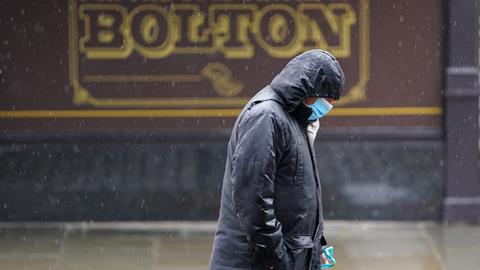England has been here before, of course – but worse. For the Great Plague of London (1665-1666), with around 100,000 dead, was our last major bubonic plague outbreak. But although Covid-19 is different (and for most of us much less deadly), both saw extensive legal restrictions.

So while we have our corpulent Coronavirus Act 2020 and a host of statutory instruments (256 as at early October 2020, with ministers having acquired an unhealthy taste for ruling effectively by decree), 17th century Londoners had their Orders Conceived and Published by The Lord Mayor and Aldermen of The City of London Concerning the Infection of The Plague, 1665. Among these, ‘all plays, bear-baitings, games, singing of ballads, buckler-play, or such-like causes of assemblies of people [were] utterly prohibited’ and ‘parties offending severely punished’; every plague-ridden house had to be ‘marked with a red cross of a foot long in the middle of the door’ and watchmen were appointed to exercise ‘a special care that no person [went] in or out of such infected houses whereof they have the charge, upon pain of severe punishment’.
Against the array of 1665 orders, the Health Protection (Coronavirus, Restrictions) (England) (No. 3) Regulations 2020 S.I. 2020 No. 750 (which expire at the end of 17 January 2021) seem relatively mild. But these regulations (in force from 18 July 2020) enable local authorities to take local Covid measures. The regulations were accompanied by useful guidance, issued the day before. Subject to specified procedural requirements, the regulations will, where necessary and proportionate, enable authorities to restrict access to, or close, individual premises, prohibit certain events (or types of event) and restrict access to, or close, public outdoor places (or types of outdoor public places).
So, under regulation 2(1) a local authority may (to the extent specified) give a direction under regulation 4(1) (individual premises), 5(1) (events) or 6(1) (public outdoor places except for specified Crown land) only if the authority considers that three conditions are met. These are: (a) that giving such a direction responds to a serious and imminent threat to public health; (b) that the direction is necessary for the purpose of preventing, protecting against, controlling or providing a public health response to the incidence or spread of infection by coronavirus in the local authority’s area; and (c) that the prohibitions, requirements or restrictions imposed by the direction are a proportionate means of achieving that purpose. Each direction power enables appeal to the magistrates’ court. Regulation 3(1) also enables the secretary of state (SoS) to direct a local authority to give a direction under one of the above provisions if the SoS considers that the three regulation 2(1) conditions would be met in relation to the proposed local authority direction.
‘Local authority’ (per regulation 1(4)) means county councils and district councils in England where there is no county council (that is, in two-tier areas, county councils and in single-tier areas, the unitary county or district council); a London borough council; the Common Council of the City of London in its capacity as a local authority; and the Council of the Isles of Scilly. Regulation 9 enables representations to be made to the SoS, regulation 10 contains provisions for public notice of directions etc, and regulation 11 deals with the requirements for notification of directions to other local authorities.
As to enforcement of directions under regulations 4(1), 5(1) or 6(1), regulation 12 empowers local authority designated officers and constables to ‘take such action as is necessary’. A prohibition notice may be issued by a local authority-designated officer if the officer reasonably believes that someone is contravening a regulation 4(1) (premises) or 5(1) (events) direction, and it is necessary and proportionate to issue the notice. Powers for constables concerning unlawful events, persons without reasonable excuse in a public outdoor place, or in respect of a child at an infringing event or public outdoor place, accompanied by an individual with responsibility for the child (see regulation 12(9)), may be exercised only if the constable considers that the measure is a necessary and proportionate means of ensuring compliance with a relevant direction. Fixed penalty notices are covered in regulation 14.
The Local Government Association (LGA) appeared to welcome the local lockdown provisions. Councillor James Jamieson, chairman of the LGA and leader of Central Bedfordshire Council, said: ‘Locally-led responses have proven to be the best way to tackle significant outbreaks, which this framework rightly emphasises. Councils know their local communities best and know how to address each unique outbreak. It is good that this framework also acknowledges the tireless efforts of councils already to try and contain and prevent local outbreaks.’
But, less locally empowering, there are now various regional regulations covering specified areas. Among recent ones are The Health Protection (Coronavirus, Restrictions) (North East of England) Regulations 2020 S.I. 2020 No. 1010. These, which came into force on 18 September 2020, cover specified areas in north-east England. The regulations (among other things) impose restrictions on certain businesses and services and restrict gatherings in private dwellings. The measures (to be reviewed by the secretary of state every 14 days from 2 October 2020) last for six months from commencement unless terminated by direction of the secretary of state.
However, the Press Association reported criticism from barrister Adam Wagner of Doughty Street Chambers that: ‘You cannot do law-making like that. You cannot do it by means by amendments in the middle of the night. It is unacceptable as a way of doing law-making. The only saving grace is that I don’t think the police are enforcing this yet because they haven’t a clue either.’ Nevertheless, various Conservative backbenchers are also unhappy and are leaning on the government to mend its legislative ways. The government has also indicated increased influence of local political opinion before future changes to Covid restrictions.
Nicholas Dobson writes on local authority, governance and public law
































No comments yet